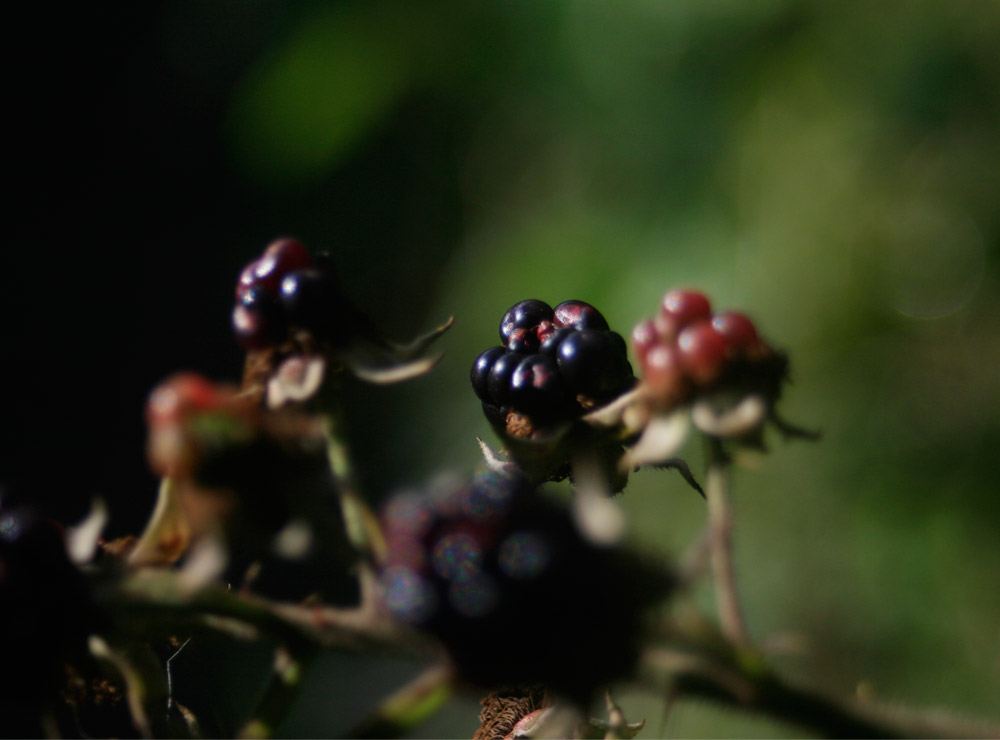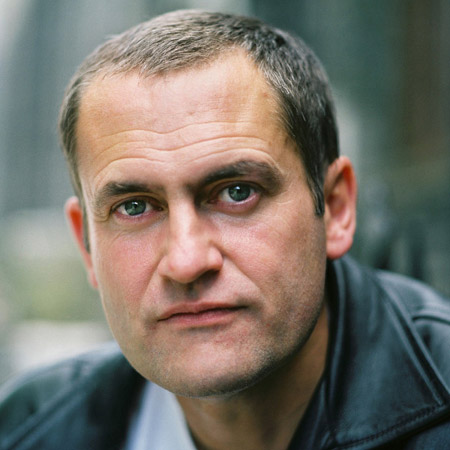This poem is part of the ILS' 'Crossing Borders' series. It is written in both Welsh and English.
Mwyara
(Rhwng 1914-18 bu chwarter miliwn o ffoaduriaid o wlad Belg yn byw dros dro ym Mhrydain. Daeth rhai i Gymru...)
Medi 1914;
cnwd toreithiog o fwyar
a daeth teulu de Wynck i aros yn ‘tŷ ni.
Darllenasai Tada’n uchel
am dymor y cwymp yn eu gwlad,
y cyrff yn lluwchio
fel dail ffawydd yn y strydoedd,
a miloedd yn ffoi...
Ac felly’r aethom i’w hebrwng o’r orsaf,
y triawd stond ar blatfform
a’u llygaid yn troelli fel mwg;
roedd eu byd i gyd llond eu hafflau...
a mab ‘run oed a minnau, yn llaw ei fam.
Drannoeth yn anghyfiaith,
fe’m hanfonwyd i fwyara, hefo fo.
Cyd-gasglu’n fud.
Bys bigo a braichgripio
ar drywydd mwyar:
braambes
nes troi’n fwyarddall;
y sfferau sgleiniog yn llenwi’n llygaid
a’r rhai tewion yn ein gwatwar
o grombil clawdd a gorfrig gwrych:
te hoog!;
rhy uchel!
Chwarddasom yn ddiniwed
a’n cegau’n ddu i gyd.
Dim ond wedyn y rhyfeddais
o weld y de Wyncks
yn rhoi’u gofal i’r Arglwydd
- drwy gyfrwng mwclis!
fel llinyn mwyar duon ymhob llaw!
Roedden nhwthau, meddai Tada,
yn diolch, ‘fath â ninnau,
am fraint pob bore newydd
heb laddwyr babanod wrth law.
A dim ond wedyn y gwyliem
Mistar de Wynck â’i gŷn main
yn cerfio’r ‘Ffoi o’r Aifft’
gydag angerdd manwl
i dalu am ei le...
a daeth Pentecost i’r papurau Cymreig!
Cafwyd colofn Vlaamsch vor Belgen
yn adrodd hynt yr oorlog,
y rhyfel hir
oedd fel cwlwm o’n cwmpas o hyd .
A dim ond wedyn...
dros bedwar gaeaf gerwin
pan fu’r mieri noeth fel weiran bigog
yn edliw inni’r rheswm
am ein cyd-fyw,
dim ond wedyn y byddwn i’n cofio
am ein tro cynta’n mwyara;
bramen plukken;
pan droes cydymdeimlad
yn weithred yn ‘tŷ ni
ac yn flaenffrwyth rhwystredigaeth
i ferch ifanc oedd yn methu'n lân
â rhoi ein hiaith ni yn dy geg.
Felly rhois i fwyar duon yn gusanau surfelys ar dy dafod syn;
bedair blynedd a hanner union,
cyn i ti a’th deulu
adael fan hyn
i godi’ch henwlad friw yn ei hôl...
*
Blackberrying
(Between 1914-18 a quarter of a million Belgian refugees settled for the duration in Britain. Some came to Wales...)
September 1914,
a profusion of blackberries:
and that was when
the de Wyncks came to stay.
Father had read out loud
about the autumn in their land,
how corpses collected
like drifts of beech leaves on the streets,
and thousands fled.
And so we fetched them
from the station platform,
a trio petrified,
their eyes swivelling like smoke;
their whole world in a few armfuls,
and their same aged son, holding his mother's hand.
Next day, without a word in common,
I was sent blackberrying with him.
We picked together, mute.
Fingerpricked and armscratched,
seeking out blackberries:
braambes,
until we were blackberryblind;
their shiny spheres filled our eyes,
the fat ones mocked us
from the depths of the hedge
and its topmost crests:
te hoog!;
too high!
And we laughed in our innocence
with purpled mouths.
It was only afterwards
that I marvelled to see the de Wyncks
putting their trust in the Lord using beads,
like blackberries, strung in each hand.
they were giving thanks like us
said Father
for the boon of each new morning
without babykillers at the door
And it was only afterwards
that we watched Mr de Wynck,
with narrow chisel and detailed intensity,
carving the 'Flight into Egypt'
to pay his way...
and our Welsh papers had their Pentecost!
Vlaamsch vor Belgen, a weekly column,
told the news of the oorlog,
the long war
that bound us together still.
And it was only afterwards...
over four harsh winters
when the naked brambles
reminded us like barbed wire
just why we shared a roof,
it was only then that I'd recall
that first time blackberry-picking:
bramen plukken;
when compassion begat action
in our house
and the first fruits of frustration
for a young girl who could not
put her language in your mouth
So I put blackberries
like sharp sweet kisses
on your surprised tongue,
four and a half years exactly,
before you and your family
left, unsung,
to rebuild a shattered country
Photo credit: roger g1 via VisualHunt / CC BY-NC-SA
Ifor ap Glyn
National Poet of Wales, performer; with un-Londonlike interest in languages
SEE PROFILE





